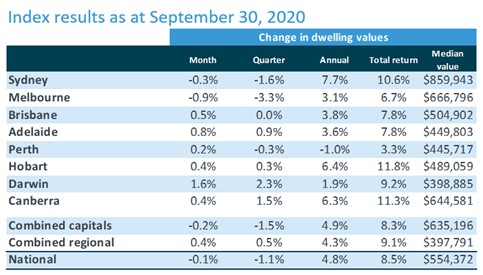26 Oct 2020
Australian Property Market Update
By Chris Lioutas - PSK Chief Investment Officer
The Australian property market remains in a state of flux, but the outlook looks significantly better than it did back in March, thanks to a combination of extraordinary fiscal and monetary stimulus and other government measures, which were needed following the government’s chosen virus policy path of suppression (ie. lockdowns).
On the commercial property front, retail and office property values have seen somewhat of a recovery, but remain well off their pre-virus highs, whilst industrial property values have powered ahead helped by the growing thematic shift to online retail. There are still plenty of issues to work through on the retail and office front, with significant pressure remaining on tenants, tenant re-leasing spreads and space, landlord incentives, and demand/supply dynamics. Some properties, landlords, and tenants will fare better than others. At this stage, there’s still too many unknowns regarding the ongoing government response to the virus, the potential for a vaccine, and how much of the changed consumer and business behaviour is temporary versus permanent. Commercial property will recover, however those unknowns will dictate how long the recovery takes.
On the residential property front, current market conditions are significantly better than expected earlier in the year, where some were expecting a more than 20% fall in property prices on rising unemployment. That has not materialised due to 3 main factors: debt repayment deferrals from the banks, the extraordinary JobKeeper and JobSeeker programs, and the government “instructing” the banks not to foreclose on anything (ie. government and/or central bank would provide additional support if needed). That has resulted in a very small fall year to date in the national capital city average with Melbourne and regional Western Australia being the hardest hit. Now volumes have undoubtedly been low whilst auction clearance rates have been rising over the last few months. Commonwealth Bank currently expects a peak to trough fall of around 6% nationally and for the trough to end in Q1 2021.

We believe there are way too many variables and unknowns right now to pick the direction of the residential housing market over the next 12-18 months. We think the government and central bank have and will do enough to limit any further material falls, but we’re not yet convinced that a price boom is likely either.
The case for a residential house price boom include:
- Limited supply
- Lower borrowing costs
- A lowering of borrowing standards
- Changes to bankruptcy laws
- Government and central bank support of the mortgage market and any rising bad debts
- Government needs to get the economy going and rising house prices will assist
The case against a residential house price boom include:
- Tapering of JobKeeper and Seeker will see some households underwater versus their pre-virus incomes
- Stubbornly high unemployment and very low wages growth
- No immigration for some time
- Oversupply of units/apartments in some cities
- The household was already heavily indebted pre-virus (the most heavily indebted household sector in the world)
- Potential drop in foreigners buying
We do know the residential landlord market remains tough from here in light of higher unemployment, low wages growth, and potential excess supply. Location and property differentiation will be key.
All in all, it’s impossible to conclude right now the next direction of residential housing prices. As much as governments and households are hoping for rising prices, hope is not an investment strategy.
If you’d like to discuss any of the points raised, please do not hesitate to contact us on 9324 8888.
PSK Financial Services Group Pty Ltd (ABN 24 134 987 205) are Authorised Representatives of Charter Financial Planning Ltd (AFSL 234666), Australian Financial services Licensee and Australian Credit Licensee. Information contained in this article is general in nature. It does not take into account your objectives, needs or financial situation. You need to consider your financial situation before making any decisions based on this information.
